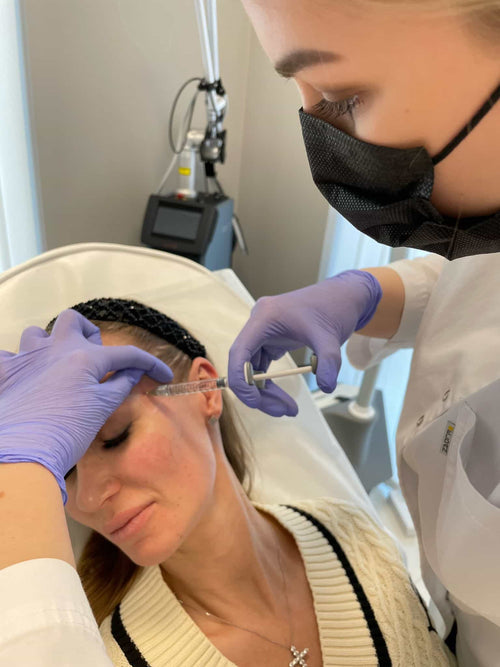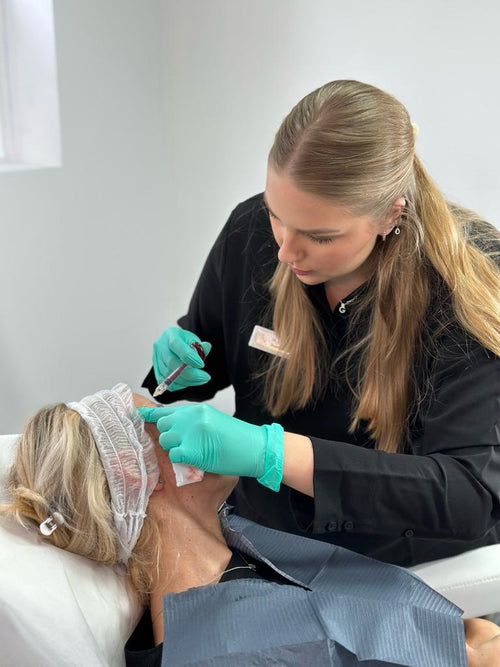Reserve a Dermal Filler Appointment with Dr. Laura Geige
The Initial Recovery Period
First 24 Hours
The initial recovery period after lip filler is crucial for optimal results and minimizing the risk of complications.
The first 24 hours following treatment are particularly important, as this is when your body begins to process the filler and inflammation peaks.
Here’s a detailed look at what to expect during the first 24 hours after lip filler:
-
Swelling & Bruising: You’ll likely experience noticeable swelling and bruising around your lips. This is normal and typically peaks within the first 24-48 hours.
-
Tenderness & Discomfort: Your lips may feel tender, sore, or even slightly numb. Over-the-counter pain relievers like ibuprofen can help manage discomfort.
-
Redness & Warmth: Expect some redness and warmth around the injection sites. This usually subsides within a few days.
-
Avoiding Alcohol: Alcohol consumption during the initial recovery period is strongly discouraged. Alcohol can:
-
Increase inflammation and swelling, prolonging healing time.
-
Thins blood, increasing the risk of bruising and bleeding.
-
Interfere with medications prescribed by your provider.
-
It’s important to follow your provider’s specific post-treatment instructions carefully. They may recommend additional measures, such as applying ice packs or avoiding certain activities.
Day 1-3: Focus on Ice and Elevation

The initial recovery period after lip filler, days 1-3, is crucial for minimizing swelling and bruising. During this time, the focus is on reducing inflammation and promoting healing.
Two key strategies are implemented during these initial days: ice and elevation.
Ice application helps constrict blood vessels, which in turn minimizes bleeding and reduces swelling. It’s recommended to apply a cold compress or ice pack wrapped in a thin towel to the treated area for 15-20 minutes at a time, several times a day.
Elevation further aids in reducing swelling by promoting lymphatic drainage. After treatment, keeping your head elevated above your heart while resting can help prevent fluid buildup in the lips.
It’s important to follow these practices diligently for the first 72 hours to optimize recovery and minimize any discomfort associated with lip filler.
Moderation is Key for Ongoing Healing
Week 1-2: Reducing Inflammation and Swelling
During the initial healing phase following lip filler injections, moderation is crucial to promote optimal recovery and minimize potential complications.
Book a Dermal Filler Appointment with Dr. Laura Geige at It’s Me and You Clinic
The first two weeks are particularly critical for reducing inflammation and swelling. Excessive alcohol consumption can significantly impede this process.
Alcohol is a known inflammatory agent. It increases blood flow and dilates blood vessels, potentially worsening swelling and bruising around the injection sites.
Moreover, alcohol can interfere with your body’s natural healing processes by suppressing the immune system and delaying tissue repair.
To support efficient healing during week 1-2, it is strongly advised to abstain from or significantly limit alcohol intake.
Giving your body a break from alcohol allows it to focus its energy on repairing the delicate tissues affected by the filler injections.
Get Started with Dermal Fillers – Consult Dr. Laura Geige
By minimizing inflammation and swelling, you enhance the chances of achieving desirable results with your lip fillers and reduce the risk of complications such as unevenness, lumps, or infection.
Week 3 Onward: Gradual Reintroduction
Week three onward marks a crucial stage in your healing journey after receiving lip filler. By now, the initial swelling and bruising should have subsided significantly, leaving you with a clearer picture of your new lip shape.
While you may be tempted to resume your usual drinking habits, moderation is key for ongoing healing and achieving optimal results.
Here’s why:
- Alcohol can dehydrate the body. Hydration is essential for tissue regeneration and reducing the risk of complications like uneven healing or lumpiness.
- Alcohol can thin the blood, increasing the likelihood of bruising and bleeding, potentially interfering with filler placement and causing discomfort.
- Alcohol can suppress your immune system, making you more susceptible to infections. This is particularly important in areas where needles have been inserted, as it increases the risk of introducing bacteria.
Gradually reintroducing alcohol after week three can minimize potential risks. Start with small amounts on special occasions and monitor your body’s reaction closely.
Listen to your body and avoid excessive consumption. Remember, prioritizing your healing allows you to fully enjoy your new lip shape without complications.

Long-Term Considerations
Maintaining Results with Responsible Drinking
Long-term considerations for maintaining results after lip filler treatments involve a holistic approach to self-care, including responsible alcohol consumption.
Here’s how responsible drinking can contribute to positive long-term outcomes:
- Reduced Swelling and Bruising: Alcohol can dilate blood vessels, potentially increasing swelling and bruising after filler injections. Limiting or avoiding alcohol for a few days post-treatment can minimize these side effects and promote faster healing.
- Minimized Risk of Complications: Alcohol can thin the blood, which may increase the risk of bleeding and complications during and after the procedure.
- Better Adherence to Aftercare Instructions: Alcohol can impair judgment and decision-making. Staying sober allows you to better follow your practitioner’s post-treatment instructions, ensuring optimal results and minimizing potential risks.
Beyond the immediate post-procedure period, responsible alcohol consumption throughout life contributes to overall skin health:
- Reduced Collagen Breakdown: Chronic alcohol abuse can damage collagen, a protein essential for maintaining skin elasticity and plumpness. By limiting alcohol intake, you protect your body’s natural collagen production.
- Improved Hydration: Alcohol is dehydrating, which can lead to dry skin and accelerate aging. Staying well-hydrated supports healthy skin and helps lip fillers look their best.
- Reduced Inflammation: Excessive alcohol consumption can contribute to inflammation throughout the body, including the skin. Limiting alcohol intake can help minimize inflammation and promote a more youthful complexion.
Remember, moderation is key. If you choose to consume alcohol, do so responsibly and in moderation to support long-term results from your lip filler treatments and maintain overall skin health.
James Martin Live Hopeless Book Critic Forever Yummalicious Food Plinr Press on Honey
- Skin Treatment & Skincare Consultations Near Godstone, Surrey - May 31, 2025
- Will People Notice If I Get Lip Filler? - May 31, 2025
- Thc Infused Seltzers In West Virginia WV - May 30, 2025